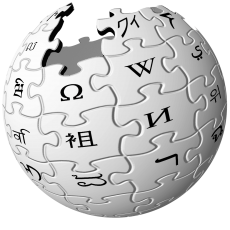Difference between revisions of "Wikipedia"
({{FA}}) |
m (however) |
||
| Line 1: | Line 1: | ||
[[File:wikipedia.png|230px|right]] | [[File:wikipedia.png|230px|right]] | ||
| − | Launched on January 15, 2001, by Jimmy Wales and Larry Sanger, [http://en.wikipedia.org/wiki/Main_Page Wikipedia] has an impressive 30 million or so articles in around 300 languages. | + | Launched on January 15, 2001, by Jimmy Wales and Larry Sanger, [http://en.wikipedia.org/wiki/Main_Page Wikipedia] has an impressive 30 million or so articles in around 300 languages. However, once over 50 thousand, the number of English-language editors Wikipedia has been in decline since 2007, and stood by Summer 2013 at around 30,000 active editors.<ref name="tdow">[http://www.technologyreview.com/featuredstory/520446/the-decline-of-wikipedia/ The Decline of Wikipedia]</ref> |
==Administrative Hierarchy== | ==Administrative Hierarchy== | ||
Revision as of 17:10, 27 October 2013
Launched on January 15, 2001, by Jimmy Wales and Larry Sanger, Wikipedia has an impressive 30 million or so articles in around 300 languages. However, once over 50 thousand, the number of English-language editors Wikipedia has been in decline since 2007, and stood by Summer 2013 at around 30,000 active editors.[1]
Contents
Administrative Hierarchy
Wikipedia bills itself as "the free encyclopedia that anyone can edit", and while that is true, reverting people's edits is really easy, and so is blocking users or IP addresses. Not everyone can do that. Who decides who can and who can't? Wikipedia editors are kept in line with what has been called "a crushing bureaucracy with an often abrasive atmosphere"[1], one which gives special permissions to a very select group of editors - privileges that can be revoked if someone's decisions are deemed 'out of line' with the Official Narrative. Wikipedia is not as radically unbiased and fair as it purports to be, and increasingly reflects the agendas of those with deep pockets who have invested in shaping it to suit their commercial purposes.
Professionalisation
Wikipedia is no longer a grassroots organisation of volunteers. The number of individuals editing it has been in decline for years[1] and nowadays it receives multi-million dollar donations from companies and grant giving foundations such as from the Ford Foundation, Omidyar Network and Google, some of which have been linked to seats on the board of the Wikimedia foundation[2]. The business of paid edits is harder to document, but WikiScanner has shown that media organisations, PR companies and the CIA are systematically editing pages of personal interest to them.
Problems with Wikipedia
- Full article: WikiSpooks:Problems with Wikipedia
- Full article: WikiSpooks:Problems with Wikipedia
The core problem of Wikipedia is the problem of establishing reliability. In accordance with its increasing professionalization, its decision to depend on "reliable secondary sources such as mainstream media", echoes the pattern of commercially-controlled media the world over. It is therefore inevitable that at least on commercially or politically sensitive topics, Wikipedia tends to display a predictable pattern of symptoms:
| Wikipedia's Problems: |
 Bias Bias
|
 Censorship Censorship
|
 Gaps Gaps
|
 Spin Spin
|
 Obfuscation Obfuscation
|
See Also
- WikipediaPlus - A tool to supplement Wikipedia with content from alternative websites such as this
- Wikipediocracy - "We exist to shine the light of scrutiny into the dark crevices of Wikipedia"
- "When a primary source isn't good enough", discussion about Wikipedia's criteria for admissibility
References
- ↑ a b c The Decline of Wikipedia
- ↑ Wikipedia doesn't need your money - so why does it keep pestering you? - Critical article from The Register
